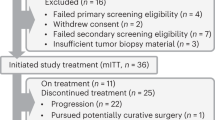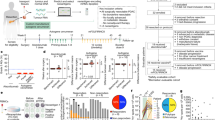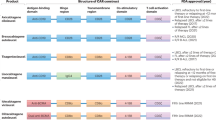Abstract
Ten patients with small cell lung cancer were treated with high dose human lymphoblastoid interferon (50-100 megaunits m-2) for 5 days, followed by low dose interferon (3 megaunits m-2) for 3 weeks. At the end of treatment, and one month later, there was no evidence of either complete or partial response. The treatment produced fever, anorexia and weight loss, with transient leucopenia and thrombocytopenia, there was evidence of a non-cholestatic elevation of serum alanine aminotransferase, with clinical deterioration in the condition of three patients presenting with hyponatraemia. A transient hypocalcaemia during high dose therapy was also noted. It seems that lymphoblastoid interferon as a single agent is unlikely to have a role in the treatment of small cell lung cancer, and that its administration as employed in this study is associated with considerable toxicity.
This is a preview of subscription content, access via your institution
Access options
Subscribe to this journal
Receive 24 print issues and online access
$259.00 per year
only $10.79 per issue
Buy this article
- Purchase on Springer Link
- Instant access to full article PDF
Prices may be subject to local taxes which are calculated during checkout
Similar content being viewed by others
Rights and permissions
About this article
Cite this article
Jones, D., Bleehen, N., Slater, A. et al. Human lymphoblastoid interferon in the treatment of small cell lung cancer. Br J Cancer 47, 361–366 (1983). https://doi.org/10.1038/bjc.1983.54
Issue Date:
DOI: https://doi.org/10.1038/bjc.1983.54



